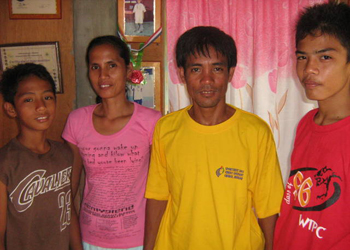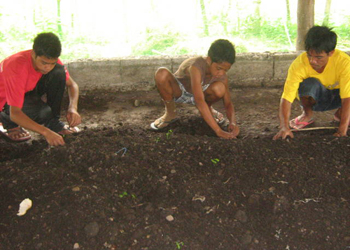 Story and photos by Leslie G. Pascua Jr. | CORD Coordinator
Story and photos by Leslie G. Pascua Jr. | CORD Coordinator
and Pollen Tuguinay | Program Officer, Northern Philippines | Heifer Philippines
Rogelio Abes Jr., or Rolly, is a member of one of the most successful partner families of the Self-Help Project, earning at least $1,190 gross income a month from vermicast, an organic fertilizer made by using African night crawler earthworms. This was a big change from the $2-$4 a day he and his wife used to make as seasonal farm laborers.
Implemented by Community One Resources Development (CORD) Inc., in partnership with Heifer International Philippines, the project ended its active life in January 2011. In the early stages of the project, participants didn’t know what vermicomposting was all about. Almost all of the community residents were busy farming and nobody appreciated the benefits of “rearing worms” for fertilizer production. They depended on chemical fertilizers and were not aware of the possible negatives of chemicals in farming.
Kitchen waste, animal manure and plant residues are collected and serve as food for the worms to produce vermicast. The average production per month is 400-600 bags (at 90 pounds/bag) of organic fertilizer and sold for $4.75 to $5.25 per bag. Rolly started his vermiculture project with 15 pounds of African night crawler earthworms and after more than two years, has about 1,100 pounds of worms that produce 4,400 pounds of vermicast per month.
Before CORD and Heifer implemented the project in the village of Bimonton in 2009, Rolly and his wife earned $2-$4 a day as seasonal farm laborers. With an average 50-60 days of work each year, they had to look for other alternative sources of income, one of which was charcoal-making.
 Rolly said, “Our income during those times was not sufficient to provide the basic needs for our family. We could not afford to send our two children to school, build a house or provide for our health needs. It was all about daily survival–we worked only for food. I noticed that charcoal-making affected the health of my family due to the hazardous smoke, and is not helpful to our environment. When I learned how to produce vermicast, I talked to my wife and decided to totally stop charcoal-making. I need to practice what we learned in Cornerstones training (Heifer’s 12 Cornerstones for Just and Sustainable Development), and charcoal-making will defeat my goal of improving the environment.”
Rolly said, “Our income during those times was not sufficient to provide the basic needs for our family. We could not afford to send our two children to school, build a house or provide for our health needs. It was all about daily survival–we worked only for food. I noticed that charcoal-making affected the health of my family due to the hazardous smoke, and is not helpful to our environment. When I learned how to produce vermicast, I talked to my wife and decided to totally stop charcoal-making. I need to practice what we learned in Cornerstones training (Heifer’s 12 Cornerstones for Just and Sustainable Development), and charcoal-making will defeat my goal of improving the environment.”
The Sustainable Environment for Better Living of Families thru Holistic and Encompassing Livelihood Programs (SELF-HELP Project) consisted of 40 original families from the village of Bimonton, which is in Mallig, Isabela, Philippines. This self-help group (SHG) attended trainings on capability enhancement, skills development, livelihood establishment and values transformation. Rolly and other group members gained knowledge and skills during the Entrepreneur Development Workshop, facilitated by Kalinga State College in partnership with CORD and Heifer Philippines.
Rolly immediately applied what he learned after the training on vermicomposting. The vermicast he produced the first six months was only enough for his backyard garden, but in 2010 he was able to produce at least 100 bags per month. CORD and Isabela State University helped him with marketing strategies and promotion in order to broaden the reach of his growing enterprise. In the same year, the Department Agriculture and other government agencies recognized and supported his vermicomposting project. The Bureau of Soils tested his vermicast and graded it as very good quality. With the help of Rolly’s group, networks were developed in the academe, cooperatives, and government and private institutions to expand the vermicomposting project.
Rolly shared his knowledge and skills with other members of the SHG for them to start the same kind of income-generating activity. He gave at least two pounds each of earthworms to his fellow members and served as a trainer and resource person. Now, other families are engaged in vermicomposting. From their composting activity, Rolly was able to buy a computer set, washing machine, television and motorbike. They can now send their two kids to school and make necessary improvements to their house. He put up their own water system so his family could have their own source of potable water, as well as for watering the plants and the vermiculture project. His family’s seed capital increased from $244 to $10,975, which includes housing and earthworms. Ninety percent of this capital comes from the vermicomposting income. In addition, Rolly established a sustainable backyard garden for his family.
 For faster decomposition of his compost, Rolly uses effective microorganisms (EM), a concept developed by Professor Teruo Higa, from the University of the Ryukyus, Okinawa, Japan. EM consists of mixing beneficial and naturally-occurring microorganisms to increase the microbial diversity of soils and plants.
For faster decomposition of his compost, Rolly uses effective microorganisms (EM), a concept developed by Professor Teruo Higa, from the University of the Ryukyus, Okinawa, Japan. EM consists of mixing beneficial and naturally-occurring microorganisms to increase the microbial diversity of soils and plants.
Because of his achievements, Rolly was nominated as one of the most outstanding farmers in the province of Isabela. Isabela’s Department of Agriculture is planning to give Rolly a warehouse and other support, and they believe Rolly could become a model organic fertilizer manufacturer and promoter for their province.
“I would be very happy if my neighbors also sustained their backyard with vermi-production activities. As a matter of fact, the demand of vermicast/organic fertilizers is increasing in the province and my small farm production unit cannot meet this demand. I always extend help to my neighbors for free with the hope that they would be encouraged to appreciate the industry. All the knowledge and skills I have I owe to our SELF-HELP Project; I almost lose hope and was contented with the little things that we had, but indeed if we help ourselves to be more useful and sustainable then we can also help others help themselves,” Rolly concluded.